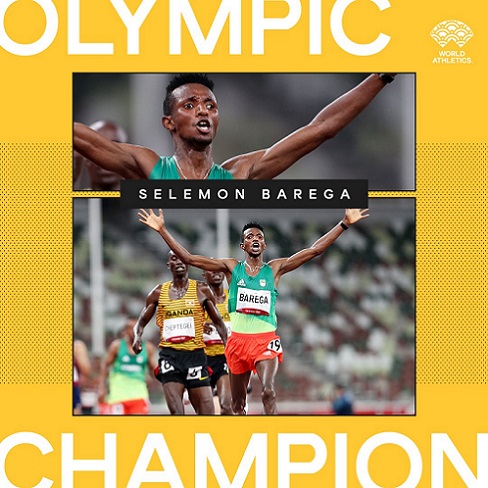"All my life, I've been running. Where I come from, a rural farm in southern Ethiopia, that's just the way of life. Need to get water for your family? You run. Buy some things at the local market? Run. Get to school, no matter how far away it is? Grab your books and run."
This is how Selemon Barega, an Ethiopian runner just a few days shy of his 19th birthday, had summed up his life two years ago while writing for the World Athletics' Spikes Magazine.
"I come from a family of eight and we all ran throughout our childhood, even if I was the first to be a competitor. My school was about 50-60 minutes from my home, depending on how fast I moved. Twice a day I'd walk or run that, ever since the age of seven," he had mentioned then.
On Friday, Barega, now 21, ran fast once again – this time not on the dirt tracks back home and to fetch the daily items of need but on the athletics track at Tokyo's Olympic Stadium to grab the men's 10,000m gold medal in his debut Olympic Games.
In a sensational late surge, Barega crossed the line first beating two runners from Uganda – world record-holder and world champion Joshua Cheptegei and world half marathon champion Jacob Kiplimo with a timing of 27 minutes, 43.22 seconds.
 As he took a flag-wrapped victory lap, his entire life would have flashed again before Barega's eyes. The moment he had dreamt of all these years was finally here. The road paved in blood, sweat and tears has ultimately led to the Olympic glory. He knew his life will now change forever, and for good.
As he took a flag-wrapped victory lap, his entire life would have flashed again before Barega's eyes. The moment he had dreamt of all these years was finally here. The road paved in blood, sweat and tears has ultimately led to the Olympic glory. He knew his life will now change forever, and for good.
With an Olympic gold, Barega has joined an elite Ethiopian club of runners which includes internationally known athletes like Abebe Bikila, Mamo Woldie, Miruts Yifter, Haile Gebresilassie, Derartu Tullu, Getie Wami, Kenenisa Bekele, Tirunesh Dibaba, Meseret Defar and many more.
While Yifter had won the 10,000m Olympic gold in Moscow (1980), Gebresilassie (1996 Atlanta and 2000 Sydney) and Bekele (2004 Athens and 2008 Beijing) had grabbed the yellow metal twice. Barega ended the 13-year medal drought in the event on Friday.
"Congratulations to Selemon Barega on winning the first gold medal in the 10,000m at the Tokyo Olympics. I wish good luck to the rest of our competitors," tweeted Abiy Ahmed Ali, the Prime Minister of Ethiopia.
It was not surprising that the first athletics gold medal of Tokyo 2020 Olympics went to a country where thousands of youngsters wake up early every day to train for long distance running. Be it the world championships, Olympics or any other international event, there is always an expectation that the Ethiopians could well produce a sweep of the medals when it comes to the marathons.There was a time when six of the fastest seven in the world were Ethiopian or Ethiopian-born with not many willing to challenge or being completely unsure of how to deal with them.
Wednesday's gold took Ethiopia's total tally of Olympic medals to 55, all of which have come in athletics events. As the International Olympic Council lists, until the 2012 Games in London, where Abeba Aregawi claimed bronze in the women's 1500m, the country had won all its Olympic medals in races over a distance of 3000m or longer.
"People often ask about the success of Ethiopians and Kenyans, but it's simple: we work very hard. I run about 120-130km a week in training. My plan is to run on the track until the 2020 Tokyo Olympics, then move to the roads," Barega wrote in 2019.
After tasting success in the 5000m and 10,000m, which he says are central to the culture of running in Ethiopia, Barega had moved out of his home in Gurage – a semi-mountainous region in south-central Ethiopia – to capital Addis Ababa, buying a new car and a house.
"I don't think about any other work. I give everything to sport. All of my thoughts are for sport. Also, when it comes to races, sometimes others get scared. But I don't get scared. If I run good, I thank god then I accept and do work, and if I don't win, I see myself weaknesses and I don't get angry," he told World Athletics, the international governing body for the sport.
The result of hard work and years of sustained effort that he put in is now there for everyone to see.




















